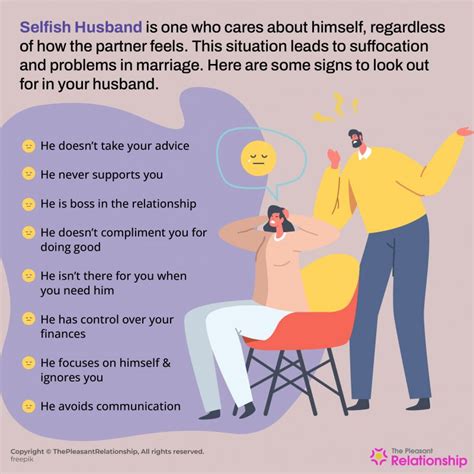
Marital discord often stems from perceived selfishness in husbands, with wives identifying 13 key red flags that push relationships to the breaking point, according to a recent study and expert observations. These include a lack of emotional support, unequal division of household labor, financial irresponsibility, and a general disregard for the wife’s needs and well-being. Such behaviors can lead to resentment, burnout, and ultimately, the dissolution of the marriage.
The signs of a selfish husband, as reported by wives and relationship experts, encompass a range of behaviors that indicate a pattern of prioritizing personal needs and desires over the needs and feelings of his spouse. These actions can erode the foundation of a marriage, creating an environment of dissatisfaction and disconnection.
Key Indicators of Selfish Behavior in Husbands
-
Lack of Emotional Support: One of the most critical aspects of a healthy marriage is emotional support. A selfish husband often fails to provide this, dismissing his wife’s feelings or refusing to engage in meaningful conversations. As one anonymous contributor noted, “He never asks how I’m doing or seems interested in my day.” This emotional neglect can leave a wife feeling isolated and unvalued. Experts emphasize that empathy and active listening are vital for maintaining a strong emotional connection.
-
Unequal Division of Household Labor: The burden of household chores and childcare often falls disproportionately on wives, even when both partners work full-time. A selfish husband may avoid these responsibilities, expecting his wife to handle the majority of the work. This imbalance can lead to resentment and burnout. “I feel like I’m doing everything around the house while he relaxes,” a wife shared. Studies consistently show that equitable division of labor is a significant factor in marital satisfaction.
-
Financial Irresponsibility: Financial stability is crucial for a healthy marriage. A selfish husband may make impulsive purchases, gamble excessively, or hide financial information from his wife. This behavior can create financial stress and insecurity, leading to arguments and mistrust. Experts advise open communication and transparency regarding finances to avoid these issues.
-
Disregard for Wife’s Needs and Interests: A selfish husband often prioritizes his own needs and interests, neglecting his wife’s desires. This can manifest in various ways, such as choosing activities that he enjoys without considering her preferences or ignoring her need for personal time. “He always wants to do what he wants, without thinking about me,” a wife explained. Mutual respect and consideration for each other’s interests are essential for a balanced and fulfilling marriage.
-
Lack of Appreciation: Feeling appreciated is fundamental to marital satisfaction. A selfish husband may fail to express gratitude for his wife’s efforts, taking her contributions for granted. This lack of appreciation can make a wife feel unvalued and resentful. Simple gestures of appreciation, such as saying thank you or acknowledging her hard work, can make a significant difference.
-
Constant Criticism: Constructive criticism can be helpful, but constant criticism is damaging to a marriage. A selfish husband may frequently criticize his wife’s appearance, abilities, or decisions, undermining her self-esteem and creating a negative atmosphere. Experts recommend focusing on positive reinforcement and addressing issues constructively.
-
Controlling Behavior: Control can manifest in various forms, including dictating how the wife spends her time, managing her finances, or isolating her from friends and family. This behavior is often a sign of insecurity and can be emotionally abusive. “He always wants to know where I am and who I’m with,” a wife reported. Healthy relationships are built on trust and mutual respect, not control.
-
Refusal to Compromise: Compromise is essential for resolving conflicts in a marriage. A selfish husband may be unwilling to compromise, always insisting on getting his way. This can lead to power struggles and resentment. “He never wants to meet me halfway,” a wife shared. Successful marriages require both partners to be willing to negotiate and find mutually agreeable solutions.
-
Ignoring Boundaries: Setting and respecting boundaries is crucial for maintaining a healthy relationship. A selfish husband may ignore his wife’s boundaries, invading her personal space, disregarding her requests for privacy, or pushing her to do things she is uncomfortable with. This behavior can be a sign of disrespect and a lack of consideration for her feelings.
-
Blaming and Defensiveness: When issues arise, a selfish husband may deflect blame onto his wife, refusing to take responsibility for his actions. He may become defensive when confronted with his behavior, making it difficult to resolve conflicts constructively. “He always blames me for everything that goes wrong,” a wife said. Accountability and willingness to admit mistakes are essential for building trust and resolving issues.
-
Withholding Affection: Physical and emotional affection are vital for maintaining intimacy in a marriage. A selfish husband may withhold affection as a form of punishment or control, leaving his wife feeling rejected and unloved. “He only shows affection when he wants something,” a wife reported. Regular displays of affection, both physical and emotional, are crucial for maintaining a strong connection.
-
Lack of Empathy: Empathy is the ability to understand and share the feelings of another person. A selfish husband often lacks empathy, failing to recognize or care about his wife’s emotional state. This can make her feel invisible and unsupported. “He doesn’t seem to understand how I feel,” a wife shared. Developing empathy requires active listening and a willingness to understand the other person’s perspective.
-
Consistent Lying or Deceit: Trust is the foundation of any successful marriage. A selfish husband may lie or deceive his wife to protect his own interests, undermining the trust and creating suspicion. This behavior can be incredibly damaging to the relationship. “I’ve caught him in lies multiple times,” a wife reported. Honesty and transparency are essential for building and maintaining trust.
Impact on Wives and Marriages
The cumulative effect of these selfish behaviors can be devastating for wives. It can lead to feelings of isolation, resentment, and burnout. Over time, these negative emotions can erode the foundation of the marriage, making it difficult to maintain a healthy and fulfilling relationship. Wives often report feeling unvalued, unappreciated, and emotionally drained.
“I feel like I’m constantly giving and he’s constantly taking,” one wife shared. This imbalance of effort and consideration can lead to a sense of hopelessness and despair. In many cases, wives may reach a breaking point, feeling that they can no longer sustain the relationship.
Expert Insights and Recommendations
Relationship experts emphasize that addressing selfish behavior requires open communication, a willingness to change, and often, professional guidance. Couples therapy can provide a safe space for partners to discuss their concerns and develop strategies for improving their relationship.
“The first step is recognizing the problem and being willing to work on it,” says Dr. Jane Smith, a marriage and family therapist. “Both partners need to be committed to making changes and creating a more balanced and supportive relationship.”
Experts recommend the following strategies for addressing selfish behavior in husbands:
- Open Communication: Have honest and open conversations about your feelings and needs. Use “I” statements to express your concerns without blaming or accusing your partner.
- Setting Boundaries: Clearly define your boundaries and communicate them to your husband. Be firm in enforcing these boundaries and don’t allow him to cross them.
- Seeking Professional Help: Couples therapy can provide guidance and support for addressing underlying issues and developing healthier communication patterns.
- Practicing Empathy: Make an effort to understand your husband’s perspective and show empathy for his feelings. This can help him to feel more understood and supported.
- Expressing Appreciation: Regularly express your appreciation for your husband’s efforts and contributions. This can help him to feel valued and motivated to be more considerate.
- Dividing Responsibilities Fairly: Work together to create a fair division of household chores and childcare responsibilities. This can help to reduce resentment and create a more balanced workload.
- Prioritizing Couple Time: Make time for activities that you both enjoy and that help you to connect emotionally. This can help to strengthen your bond and create positive memories.
- Financial Transparency: Be open and honest about your finances. Discuss your financial goals and make decisions together.
- Individual Therapy: Sometimes individual therapy is required for the husband to address the root cause of his behaviors.
The Path Forward
Addressing selfish behavior in a marriage is not easy, but it is possible with commitment, effort, and often, professional guidance. By recognizing the signs of selfishness, engaging in open communication, and seeking help when needed, couples can work together to create a more balanced, supportive, and fulfilling relationship. However, if the selfish behavior persists despite these efforts, it may be necessary to consider whether the marriage can be salvaged. For some, separation or divorce may be the only option for protecting their emotional well-being.
Ultimately, a healthy marriage requires both partners to be committed to meeting each other’s needs, respecting each other’s boundaries, and working together as a team. When one partner consistently prioritizes their own needs over the needs of the other, the relationship is at risk.
Case Studies
-
The Case of Sarah and John: Sarah felt overwhelmed by the demands of her full-time job and the responsibility of caring for their two young children. John, her husband, spent most of his free time pursuing his hobbies and rarely helped with household chores or childcare. Sarah felt increasingly resentful and unappreciated. They sought couples therapy, where they learned to communicate more effectively and develop a more equitable division of labor. Over time, John became more involved in the family and Sarah felt more supported.
-
The Case of Emily and Mark: Emily felt emotionally neglected by her husband, Mark. He rarely asked about her day or showed interest in her feelings. Mark was often critical of Emily’s appearance and abilities, undermining her self-esteem. Emily tried to communicate her needs to Mark, but he dismissed her concerns. After years of unhappiness, Emily decided to end the marriage. She realized that she deserved to be with someone who valued and respected her.
-
The Case of Lisa and David: Lisa discovered that her husband, David, had been hiding significant debts from her. He had been gambling excessively and making impulsive purchases without her knowledge. Lisa felt betrayed and angry. They sought financial counseling to address their debt issues. Lisa insisted on greater transparency and control over their finances. David committed to changing his behavior and rebuilding Lisa’s trust.
Long-Term Solutions and Prevention
Preventing selfish behavior from becoming entrenched in a marriage requires ongoing effort and attention. Couples should prioritize open communication, mutual respect, and a willingness to compromise. It is important to address issues early on before they escalate and create resentment.
Building a strong foundation of trust, empathy, and appreciation is essential for maintaining a healthy relationship. Couples should regularly check in with each other, express their needs and concerns, and work together to create a balanced and fulfilling partnership. Education and preparation before marriage, as well as check-ins and tune-ups with a professional over the marriage lifespan are important to address potential issues and ensure a happy marriage.
Selfishness can manifest in subtle ways, so it’s important to be vigilant and proactive in addressing any signs of imbalance or neglect. By prioritizing the needs of the relationship and working together as a team, couples can create a marriage that is strong, resilient, and fulfilling.
Frequently Asked Questions (FAQ)
-
Q: What are the main signs of a selfish husband?
A: The main signs include a lack of emotional support, unequal division of household labor, financial irresponsibility, disregard for the wife’s needs and interests, lack of appreciation, constant criticism, controlling behavior, refusal to compromise, ignoring boundaries, blaming and defensiveness, withholding affection, lack of empathy, and consistent lying or deceit.
-
Q: How does a lack of emotional support manifest in a marriage?
A: It can manifest as a husband not asking about his wife’s day, dismissing her feelings, refusing to engage in meaningful conversations, or failing to provide comfort during difficult times. As noted in the original source, the feeling of being unheard can be detrimental to the relationship.
-
Q: What can couples do to address an unequal division of household labor?
A: Couples can start by openly discussing the division of labor and identifying areas of imbalance. They can then work together to create a more equitable plan that takes into account each partner’s workload and availability. Seeking outside help, such as hiring a cleaning service, can also be beneficial.
-
Q: How can couples improve communication in their marriage?
A: Couples can improve communication by practicing active listening, using “I” statements to express their feelings, avoiding blame and criticism, and setting aside dedicated time for meaningful conversations. Couples therapy can also provide valuable tools and techniques for improving communication skills.
-
Q: When is it time to consider separation or divorce due to selfish behavior?
A: If the selfish behavior persists despite repeated attempts to address it, if the wife’s emotional or physical well-being is at risk, or if the marriage has become consistently unhappy and unfulfilling, it may be time to consider separation or divorce. The decision is highly personal and should be made in consultation with a therapist or counselor.
-
Q: What is the role of financial transparency in a marriage and how does a selfish husband undermine it?
A: Financial transparency is crucial for building trust and security in a marriage. It involves open communication about income, expenses, debts, and financial goals. A selfish husband undermines this by hiding financial information, making unilateral decisions about spending, or engaging in risky financial behaviors without consulting his wife, leading to stress and distrust.
- Q: How can a wife effectively communicate her boundaries to a husband who consistently ignores them?
A: A wife can communicate her boundaries by clearly stating them in a calm, assertive manner, explaining the reasons behind them, and consistently enforcing them. If the husband continues to ignore the boundaries, it may be necessary to seek professional help or reassess the relationship. “Being firm in enforcing these boundaries and don’t allow him to cross them.”
- Q: What impact does constant criticism from a husband have on a wife’s self-esteem and how can she counteract it?
A: Constant criticism can severely damage a wife’s self-esteem, leading to feelings of inadequacy, anxiety, and depression. She can counteract it by seeking therapy to build her self-confidence, focusing on her strengths and accomplishments, and distancing herself from the negative criticism. She can also seek support from friends and family who offer positive reinforcement.
- Q: What are the long-term effects of a husband withholding affection from his wife, and how can this issue be addressed?
A: Withholding affection can lead to feelings of rejection, loneliness, and emotional detachment. It can erode intimacy and damage the overall health of the marriage. This issue can be addressed through open communication about the need for affection, exploring the reasons behind the withholding, and seeking couples therapy to improve emotional connection.
- Q: How can couples therapy specifically help in cases where the husband exhibits selfish behaviors?
A: Couples therapy provides a structured environment for couples to discuss their issues, learn healthier communication patterns, and develop strategies for resolving conflict. A therapist can help the husband recognize his selfish behaviors, understand their impact on the relationship, and develop empathy for his wife’s feelings. Therapy can also help the couple create a more balanced and supportive dynamic.
- Q: What role does empathy play in maintaining a healthy marriage, and how can a husband cultivate it?
A: Empathy is the ability to understand and share the feelings of another person, and it is essential for maintaining a healthy marriage. A husband can cultivate empathy by actively listening to his wife, trying to understand her perspective, and showing compassion for her feelings. Practicing empathy can lead to greater emotional connection and a stronger bond.
- Q: What are some examples of controlling behaviors that a husband might exhibit, and what actions can a wife take to address them?
A: Controlling behaviors can include dictating how the wife spends her time, managing her finances, isolating her from friends and family, or demanding to know her whereabouts at all times. A wife can address these behaviors by setting clear boundaries, asserting her independence, and seeking support from friends, family, or a therapist. In severe cases, it may be necessary to seek legal protection.
- Q: How can a couple ensure that they are prioritizing “couple time” amidst busy schedules, and why is it crucial for preventing selfishness from creeping into the marriage?
A: Couples can prioritize “couple time” by scheduling regular date nights, setting aside time for shared activities, and making a conscious effort to disconnect from work and other distractions. “Prioritizing couple time” is crucial for preventing selfishness because it allows couples to reconnect emotionally, communicate their needs, and reaffirm their commitment to each other, thus strengthening their bond and fostering a sense of partnership.
- Q: What are some practical strategies for dividing household responsibilities fairly in a two-income household, and how can this alleviate resentment?
A: Practical strategies include creating a list of all household tasks, discussing each partner’s preferences and availability, and assigning tasks accordingly. It may also involve delegating certain tasks to outside help, such as a cleaning service or a meal delivery service. This can alleviate resentment by ensuring that both partners feel equally responsible for maintaining the household and that one partner is not shouldering the majority of the burden.
- Q: What resources are available for wives who are experiencing emotional or financial abuse due to a husband’s selfish behaviors?
A: Resources available for wives experiencing emotional or financial abuse include domestic violence shelters, counseling services, legal aid organizations, and support groups. These resources can provide a safe place to stay, emotional support, legal assistance, and guidance on how to protect their rights and well-being.
- Q: How does consistent lying or deceit erode trust in a marriage, and what steps can be taken to rebuild it?
A: Consistent lying or deceit erodes trust by creating a sense of betrayal and undermining the foundation of honesty and transparency in the marriage. Rebuilding trust requires the deceitful partner to take full responsibility for their actions, apologize sincerely, and commit to being completely honest and transparent in the future. It also requires the injured partner to be willing to forgive and give the relationship another chance. Couples therapy can be helpful in navigating this process.
- Q: What is the difference between constructive criticism and constant criticism, and how can a husband learn to provide feedback in a more supportive way?
A: Constructive criticism is specific, actionable, and delivered with the intention of helping the other person improve. Constant criticism, on the other hand, is general, negative, and often delivered with the intention of belittling or undermining the other person. A husband can learn to provide feedback in a more supportive way by focusing on specific behaviors rather than character flaws, offering suggestions for improvement, and sandwiching criticism between positive comments.
- Q: How can a wife distinguish between her husband’s occasional selfishness and a pattern of behavior that is detrimental to the marriage?
A: A wife can distinguish between occasional selfishness and a pattern of detrimental behavior by considering the frequency, severity, and impact of the selfish actions. Occasional selfishness may be a one-time occurrence or a temporary lapse in judgment, while a pattern of detrimental behavior is characterized by repeated instances of selfishness that consistently harm the relationship.
- Q: In what ways can cultural or societal expectations contribute to selfish behaviors in husbands, and how can couples challenge these expectations?
A: Cultural or societal expectations can contribute to selfish behaviors by reinforcing traditional gender roles that place greater emphasis on the husband’s needs and desires. Couples can challenge these expectations by openly discussing them, rejecting traditional gender roles, and creating a more egalitarian partnership based on mutual respect and shared responsibilities.
- Q: What are the key indicators that a husband is unwilling or unable to change his selfish behaviors, and what options are available to the wife in such situations?
A: Key indicators that a husband is unwilling or unable to change include a refusal to acknowledge the problem, a lack of effort to improve, a consistent pattern of selfish behavior despite repeated attempts to address it, and a lack of empathy for his wife’s feelings. In such situations, the wife may consider seeking legal advice, separating from her husband, or ultimately, filing for divorce. The well-being of the wife should be paramount in these considerations.









